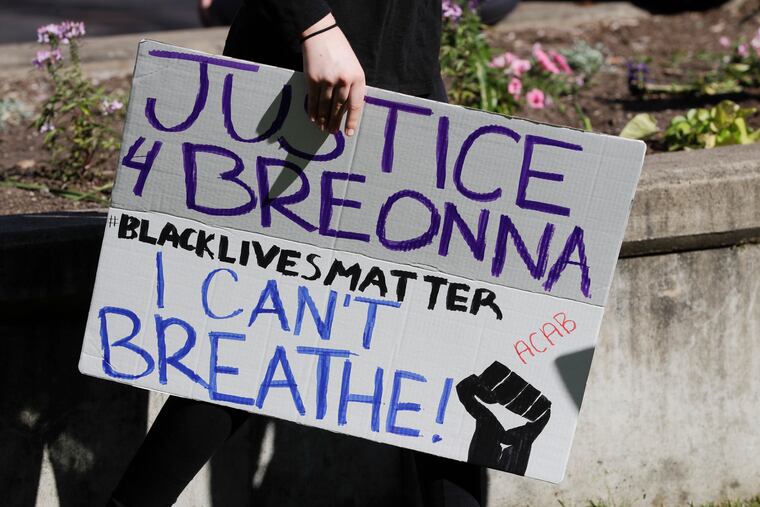Louisville bans ‘no-knock’ warrants after police killing of Breonna Taylor inside her home
The 26 local officials who represent districts in the state's largest city voted to pass "Breonna's Law," which also requires police and corrections officers to wear body cameras while serving warrants.

After weeks of protests in Louisville inspired by the police killing of 26-year-old Breonna Taylor in her home, the city council unanimously voted on Thursday to ban local law enforcement from using "no-knock" warrants, which allow officers to enter a home unannounced.
The 26 local officials who represent districts in the state's largest city voted to pass "Breonna's Law," which also requires police and corrections officers to wear body cameras while serving warrants. Officers did not wear their cameras during the shooting that killed Taylor, an emergency room technician studying to be a nurse.
"Breonna, that's all she wanted to do was save lives," Taylor's mother, Tamika Palmer, said at a news conference after the council vote. "With this law, she'll get to continue to do that. So, we're grateful for that. She would be so happy."
Taylor was killed during a police raid that started with a no-knock warrant. Plainclothes officers entered Taylor's home just after midnight on March 13. Taylor's boyfriend, Kenneth Walker, who lived with her, said he did not realize that the officers were police and fired one shot that hit a police sergeant's leg. Taylor was shot at least eight times and killed when officers opened fire in response.
Walker was charged with attempted murder of a police officer, but prosecutors dropped the complaint in late May. No officers have been arrested or charged in Taylor's death.
Police have said they knocked before forcing entry into the home with a battering ram, but witnesses have disputed that claim. The warrant did not require the officers to make their presence known.
The no-knock warrant was part of a narcotics investigation, but neither Taylor nor Walker had prior drug convictions or arrests, and no drugs were found in the home. Although the primary targets of the investigation were allegedly operating more than 10 miles from Taylor's home, a judge signed a no-knock warrant to allow police to search her apartment because they believed one suspect had received packages at the address, the Louisville Courier-Journal reported. The postal inspector police cited to justify the warrant has since said police did not contact his office, and a previous inquiry about Taylor's address found "no packages of interest going there," WDRB reported.
The city council vote formalizes and extends a temporary ban instituted by Louisville Democratic Mayor Greg Fischer on May 29 in response to protesters' demands.
» READ MORE: Live coverage of what's happening Friday, June 12
Sen. Rand Paul, R-Ky., proposed a federal bill Thursday that would outlaw no-knock warrants in virtually every jurisdiction in the country. Paul said he was spurred to sponsor the legislation after having conversations with Taylor's family.
"It's long past time to get rid of no-knock warrants," Paul said in a statement.
The Justice for Breonna Taylor Act would ban federal law enforcement agencies from using no-knock warrants, and also require any local police agency that receives money from the Justice Department to comply with the ban.
The bill would mandate police provide "notice of his or her authority and purpose" before executing a warrant. After officers make a declaration identifying themselves as police and announcing the warrant, they would then be allowed to forcibly enter a person's home, business or other private property.
"I think it's just the beginning, but I'm definitely satisfied," Taylor's mother told the Courier-Journal. "I definitely think it will help families after mine."
The protests in Louisville that inspired both the local ban and Paul's proposal emerged alongside Black Lives Matter demonstrations around the U.S. and world following George Floyd's death in Minneapolis after an officer knelt on his neck for nearly nine minutes. But demonstrators in the Kentucky city have also expressed outrage over two other black people killed in their community in recent months, Taylor and local restaurant owner David McAtee.
McAtee, 53, was shot and killed by officers enforcing curfew after they say he fired a shot as officers fired pepper balls to disperse people gathered near his barbecue shop. Known locally as "YaYa," McAtee regularly gave police free food and was revered in his community.
His family has said they believe McAtee was defending his niece, who appeared to narrowly miss being struck by a pepper ball in silent surveillance footage just before McAtee fired his gun. Critics have said Louisville police were too quick to resort to force to scatter the crowd, which was not protesting at the time, without first asking people to leave the area.
In addition to the local ban on no-knock warrants, public outcry over the deaths also resulted in the police chief being fired and the governor ordering a review of the investigation into Taylor’s death.